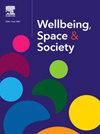Growing closer: Addressing nature disconnection in dementia
IF 2.2
Q2 GEOGRAPHY
引用次数: 0
Abstract
While the benefits of nature connection for people with dementia are well known, many with the condition live physically and emotionally disconnected from nature. This metasynthesis aims to explicate the process of building and sustaining nature connection while experiencing the challenges of dementia, in order to offer evidence-based solutions and a pathway to positive change. We analysed and synthesized qualitative findings from 37 studies to develop a theoretical framework that illuminates the central phenomenon of (dis)connection with nature while experiencing dementia. This theoretical framework explicates the influencing factors as well as outcomes of this phenomenon. The framework demonstrates that building and sustaining connection with nature is hindered by intersecting personal and external factors, including physical, cognitive, and emotional changes; availability of resources and support; and environmental barriers. Solutions include facilitating strategies, such as inclusive and individualised nature-based activities, accessible and enabling environments, and effective communication, education, and coordination. Critical positive outcomes from meaningful nature connection include improved physical, cognitive, mental, and emotional health, enhanced social connection, meaningful participation, and caregiver well-being. This theoretical framework has potential to guide policy and inspire support efforts, identifying starting points and avenues for more effective and enabling ways to ensure people with dementia are living well. This paper identifies areas for future investigation into the influencing factors and impacts of nature connection for people with dementia across settings.
越来越近:解决痴呆症中的自然脱节问题
虽然与自然联系对痴呆症患者的好处是众所周知的,但许多痴呆症患者在身体和情感上都与自然脱节。这一综合旨在阐明在经历痴呆症挑战的同时建立和维持自然联系的过程,以提供基于证据的解决方案和积极改变的途径。我们分析和综合了37项研究的定性结果,以建立一个理论框架,阐明了在经历痴呆症时与自然(脱节)联系的核心现象。这一理论框架阐明了这一现象的影响因素和结果。该框架表明,与自然建立和维持联系受到个人和外部因素交叉的阻碍,包括身体、认知和情感变化;可获得的资源和支持;还有环境障碍。解决方案包括促进战略,如包容性和个性化的基于自然的活动,无障碍和有利的环境,以及有效的沟通、教育和协调。有意义的自然联系的关键积极结果包括改善身体、认知、心理和情感健康,增强社会联系,有意义的参与和照顾者的福祉。这一理论框架有可能指导政策和激励支持工作,确定起点和途径,以更有效和有利的方式确保痴呆症患者生活得更好。本文确定了未来研究影响因素和自然联系对痴呆症患者的影响的领域。
本文章由计算机程序翻译,如有差异,请以英文原文为准。
求助全文
约1分钟内获得全文
求助全文
来源期刊

Wellbeing Space and Society
Social Sciences-Social Sciences (miscellaneous)
CiteScore
2.70
自引率
0.00%
发文量
46
审稿时长
124 days
 求助内容:
求助内容: 应助结果提醒方式:
应助结果提醒方式:


